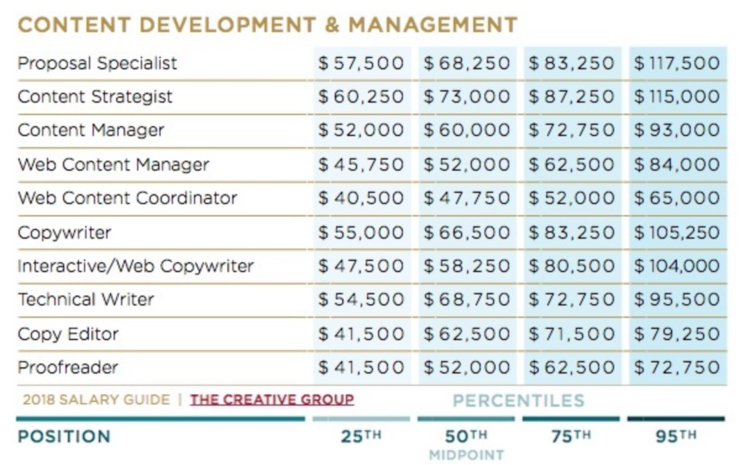Editor’s Note: This post on salary negotiation originally appeared on the BostonContent blog on November 27th, 2017. That being said, shoring up your negotiation skills never goes out of style Enjoy!
P.S. If you know a writer – pay them what they’re worth.

Remember those carefree days of college? Hanging out on the quad during a delicious spring day feeling the warmth of the sun on your skin?
Some people pine for those lazy, laid back afternoons. Not I. Back then, I couldn’t wait to get out into the “real world” and start working. I wanted money, and I wanted clips. While in journalism school, I couldn’t help but wonder, how far could I have climbed the rungs of a publication in the four years I spent earning a degree? I felt like I was wasting time.
That sense of urgency hasn’t left me. And in that way, I’ve always been passionate about career advocacy and advancement: learning new skills, seeking out mentors, networking at conferences. That’s why recently, when I came across the 2018 Marketing Salary Guide, which put the median salary of a web content manager at $52,000, I felt compelled to offer (unsolicited) advice.

Source: MarketingProfs
Let’s examine additional salary data:
- Bloggers make $45,000 to $70,000. Content Marketing Institute
- Nationwide, Content Marketing Managers earn approximately $73,000. Glassdoor
- Content Strategists command anywhere from $81,000 – $115,000. Curata
Wherever you are in your content career, you’re likely facing the same issue as many of your peers: how to get paid what you’re worth. You’re not average and you shouldn’t be paid an average salary! Content marketers are a perfect blend of artistic and analytical talents, bringing immense value to an organization. I could wax on about the importance of content marketing, but simply put: Every marketing touchpoint is dependent on intelligent content. So, how do you go about monetizing your value? Here’s my advice.
MY FIRST (AND LAST) SALARY NEGOTIATION MISTAKE
Like anything, negotiation is a skill, and we need to start learning early. Admittedly, I didn’t negotiate well at my first job in media sales. During the exciting offer call, my manager simply stating what the salary was — she stated it. To me, it didn’t feel open to discussion. When I deliberated as to how to proceed, she interrupted my silence with, “That is what the role pays,” in a very matter-of-fact tone.
I balked and then accepted.
Later, I was disappointed in myself. Having researched salary negotiation (the actual blog), I learned from at 24 I had tactics I was ready to put to use! That being said, the salary was fair, and I was lucky to work for a good manager. She educated me on the products I was selling so well, and I easily started making an additional 30% on my base in commission.
I’m not in sales anymore, but I like that green stuff. I like money. I’m not materialistic, but I enjoy the experiences that money can afford. Never be ashamed to talk money. We all have goals and money helps us meet them. I haven’t hesitated since that early moment, which has allowed me to raise my base salary by roughly $20,000 every two years.
That was my first and my last negotiation misstep, and soon, you’ll be a negotiation master as well.
Below, I’ve provided some scripts that should help you to respond to, as well as introduce the topic of negotiation while in a job transition.
HOW TO NEGOTIATE WITH A RECRUITER OR HIRING MANAGER
I love recruiters. It’s not a common sentiment perhaps, but when it comes to negotiating numbers, they’re frank — and I appreciate this. This honesty should allow you, as the content marketer, to feel extremely comfortable talking about what you want to be paid in a given role.
Your first “friendly chat” with a recruiter will be exploratory on both sides, and compensation will be discussed. Be ready.
Do your research — but don’t lowball yourself.
Of course research salary sites like Payscale, Glassdoor and Salary.com. What is the going rate in your area? But remember, we should all want to help content marketers earn a higher average salary, and sticking with the status quo won’t achieve this aim. Use this number as your low benchmark. Your years of expertise and complementary skill sets could make you much more valuable than crowdsourced data!
Don’t forget to also do an internal audit. What do you need to be paid to support your current lifestyle and achieve growth-oriented personal goals? Run the numbers.
Lastly, research the company. How great is their content need? Their current content savvy? By assessing their digital sales process, you can also estimate how much value content interactions will have to the company. You want a piece of this.
Here are the scripts I promised. Recruiters will typically ask you one of two questions:
“WHAT DID YOU MAKE IN YOUR PREVIOUS ROLE?”
Your Script: “I made [X] at my last job [NAME], but like anyone, I would like to improve on that number. Based on my number of years in the field and what I think I can achieve for [X company], I’d like to make [X].” (List your highest number — you can negotiate later.)
Note: Legislators understand that being underpaid can follow you from job to job. For that reason, the above question has been made illegal in the state of Massachusetts and major metropolises like New York City and Philadelphia. Illinois, Maine, Maryland, New Jersey, New York, Pennsylvania, Rhode Island, and Vermont are considering similar laws in an effort to close the wage gap. For those Boston Content members applying for jobs outside of Massachusetts or considering remote work, remember that often recruiters expect an applicant to slightly pad their salary history or to supply a number in line with what they would like to earn in their next role.
“WHAT ARE YOUR SALARY REQUIREMENTS?”
Your Script: “I’m glad you asked. I would like to be in the range of [X] to [X] given my expertise and what I’d like to accomplish for [X] company /goals we have discussed for the business. That is what I would need to feel comfortable moving forward. Does this fit with the range for the role?”
When applying for a job with a hiring manager, the process will be slower and discussions around compensation will be more nuanced. In fact, there is even this assumption you should take the job purely because you love it. That is silly and unrealistic.
HOW TO TALK ABOUT YOUR SALARY WITH A HIRING MANAGER
Inevitably, as you get further in the interview process, the hiring manager will give you some insight into how the organization works, how teams interface, and future plans for the marketing team. Follow it up with the below script:
Your Script: “Thank you for sharing this information with me. Speaking of the development of this role/growing your team, has a budget or compensation range been approved for [X role]?”
Then, wait. Silence is your friend. Don’t negate or soften your question by explaining why you’re inquiring. It’s a reasonable expectation.
The above question provides clarity, allowing you to understand the progress your potential manager has made in getting a budget approved. This process could still be underway and it’s vital for you to know if the manager is interviewing candidates but “flying blind” as to her salary limitations.
One time, a manager and I came to a mutual consensus not to work together after the budget approved did not meet my salary requirements. To her credit, she didn’t ask me to accept less. This could happen: You could price yourself out of a job. Alternatively, you would be unhappy and unhealthy in a low-paying job. Ask about the salary approval process after your first in-person meeting, ideally upon accepting to return for additional interview rounds.
Negotiation isn’t combative; it’s collaborative! Both parties are looking to make the other happy so the working relationship can start on a positive note. Go high! This is a starting point for negotiation with the expectation that you’ll meet somewhere in the middle. So come to the table with ideas, passion, and most importantly, confidence.
You may be surprised; they may say, “YES!”
Related Content
SEO & Content Marketing: 3 Steps for Building a Strategy Search Engines Love
4 Ways to Boost Your Blog’s Ranking with an SEO Content Strategy




